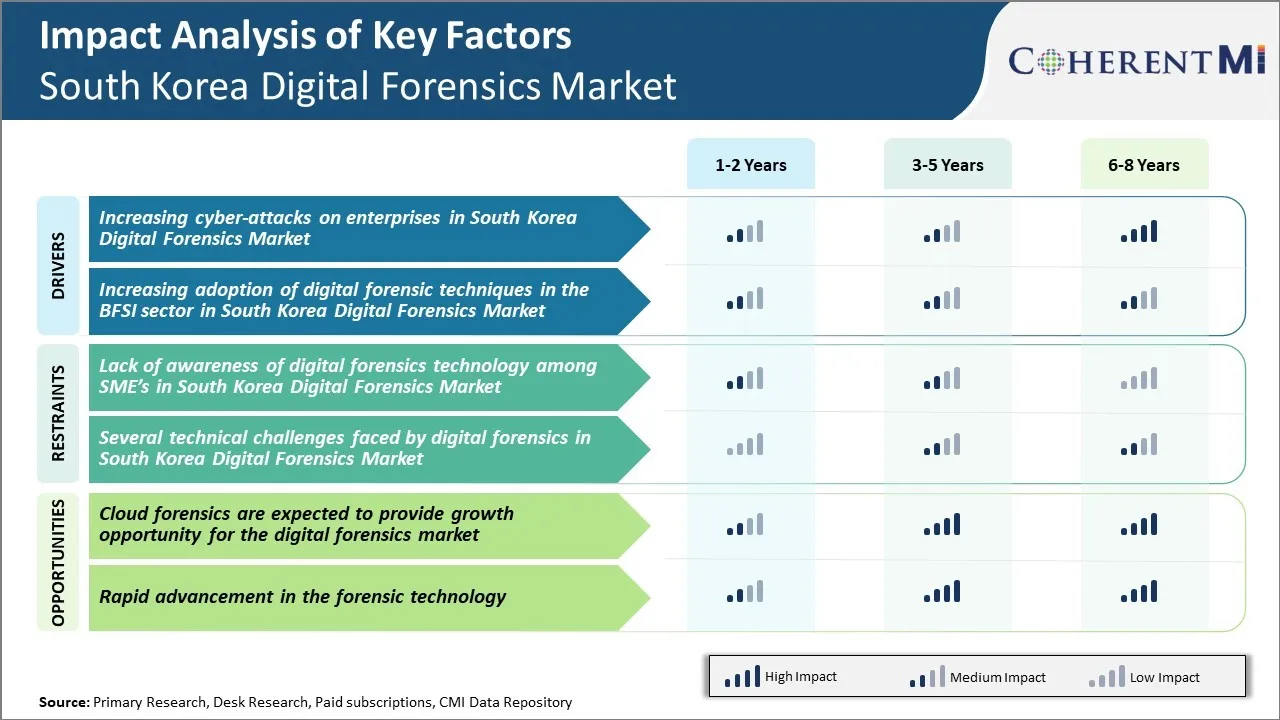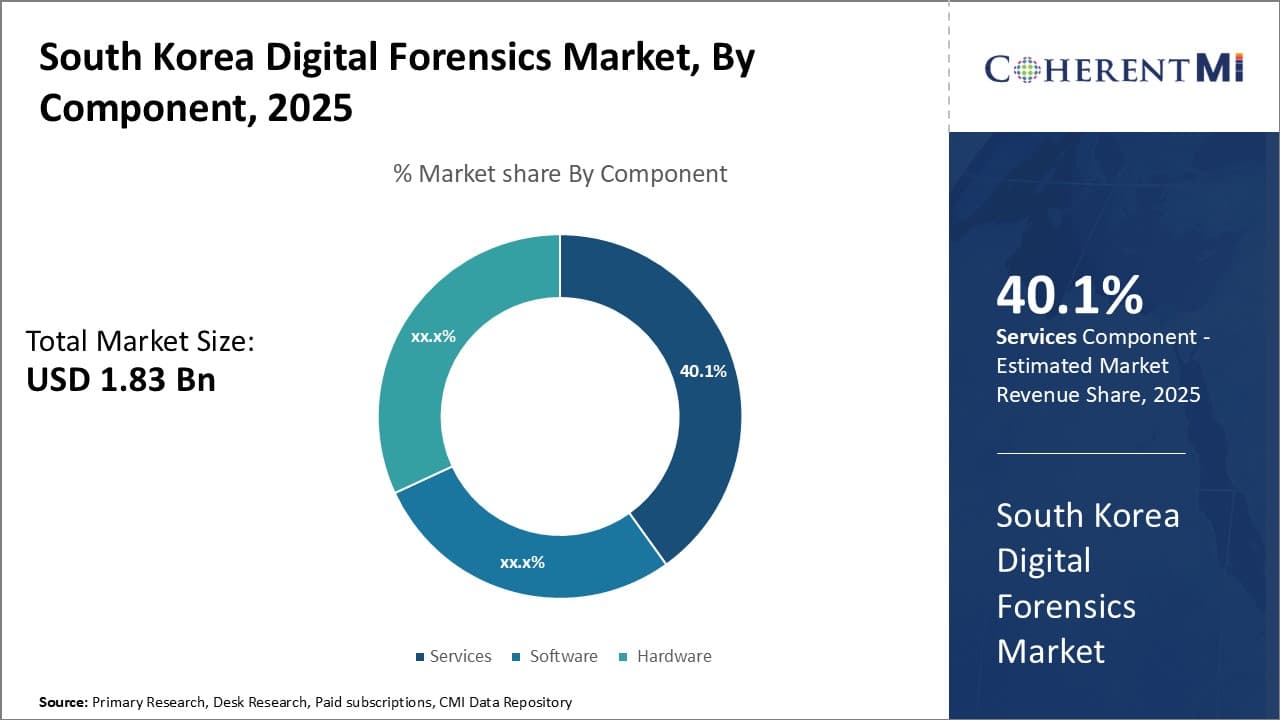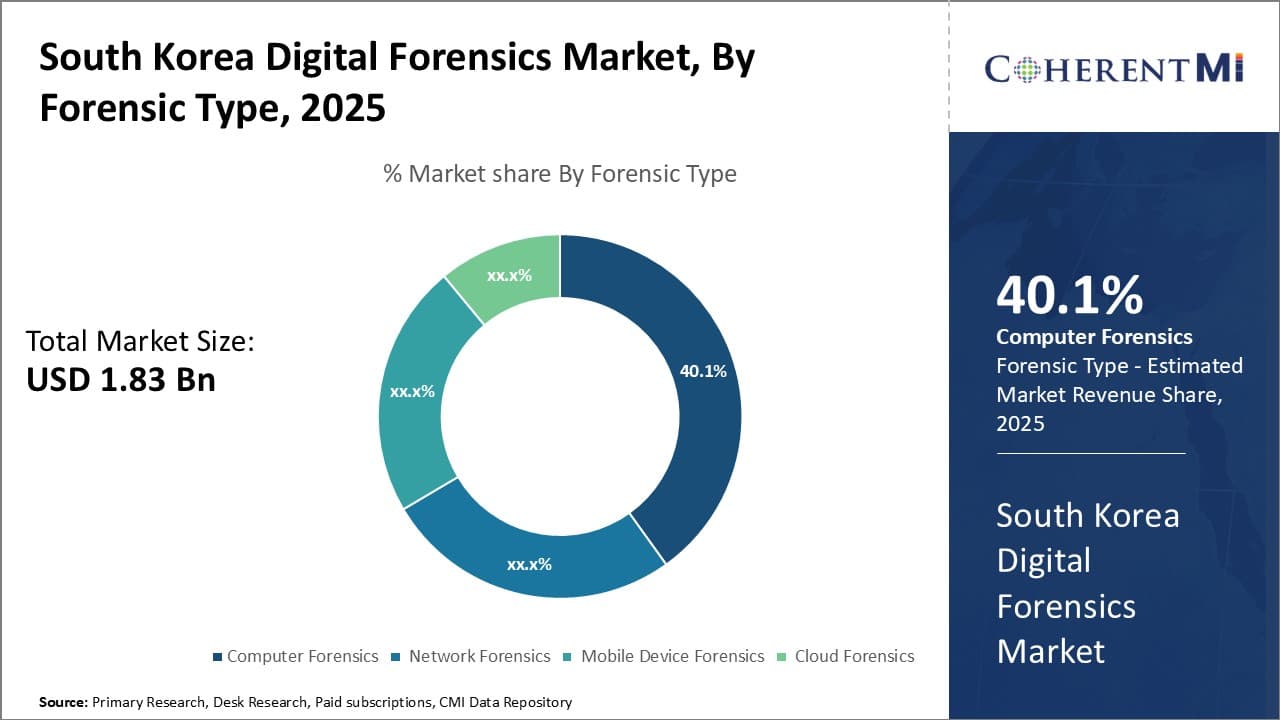

The South Korea Digital Forensics Market is estimated to be valued at USD 1.83 Bn in 2025 and is expected to reach USD 3.97 Bn by 2032, growing at a compound annual growth rate (CAGR) of 11.7% from 2025 to 2032.
The market is expected to witness positive growth over the forecast period. The increasing number of cybercrimes in the country has compelled various law enforcement agencies and companies to incorporate digital forensic solutions. South Korea has been among the leading countries impacted globally due to cyberattacks and data breaches. As cybercrimes continue to rise in complexity, the adoption of digital forensics is projected to increase over the coming years. Additionally, the availability of government funding and initiatives for strengthening cybersecurity infrastructure will also contribute to the growth of the digital forensics market in South Korea. However, lack of skilled professionals and high costs associated with digital forensic solutions are some factors that may hamper the overall expansion of this market.
Market Size in USD Bn
CAGR11.7%
| Study Period | 2025-2032 |
| Base Year of Estimation | 2024 |
| CAGR | 11.7% |
| Market Concentration | Medium |
| Major Players | AhnLab, FireEye, IBM Corporation., Guidance Software, Inc./OpenTextCorp., FireEye, HancomWITH and Among Others |
Drivers of the Market:
Driver One: Increasing cyber-attacks on enterprises in South Korea
With the rapid digitization across various industries, South Korea has emerged as a global leader in technology adoption. However, this widespread connectivity has also exposed businesses to new cybersecurity risks. Over the past few years, cybercriminals have frequently targeted South Korean companies in an attempt to steal sensitive data for financial gains or geo-political reasons. Some of the most common cyber-attacks seen in the country include phishing, malware attacks, and ransomware infections. Large enterprises operating in key sectors like manufacturing, banking, utilities have been prime targets of such attacks due to the vast amounts of valuable customer and operational data they possess.
The frequency and sophistication of cyber-threats have increased substantially amid remote working environments during the pandemic. Attackers are leveraging more advanced techniques like zero-day vulnerabilities and multi-stage infection chains to infiltrate corporate networks undetected. Once inside, they perform espionage activities or actively work to disrupt normal business functions. Defending against cyber-attacks has become a top priority for C-suite executives given the massive financial and reputational losses associated with a breach. However, most companies lack the in-house expertise and resources required to properly investigate a security incident after the fact. This is where digital forensics solutions have become highly valuable.
By applying scientific methods, digital forensics experts are able to recover and analyze digital evidence from compromised systems and networks. This allows incident responders to accurately determine the root cause, scope and timeline of an attack. Such insights help create strategies for beefing up defenses as well as attributing blames. The post-breach investigations and evidence gathering required strict adherence to forensics best practices and chain of custody procedures. As cyber-risks multiply at an alarming rate, businesses have started proactively leveraging forensics-as-a-service and managed security services from specialist firms. This is driving strong demand and pushing the digital forensics market in South Korea to new heights.
Driver Two: Increasing adoption of digital forensic techniques in the BFSI sector
The banking, financial services and insurance (BFSI) sector in South Korea controls huge volumes of highly sensitive customer data, making it a lucrative target for cybercriminals. Further, digital transformation across the industry has led to widespread usage of Internet and mobile banking channels. While offering tremendous convenience to users, this has correspondingly expanded the attack surface. Unfortunately, many financial organizations still rely on outdated security controls which are proving ineffective against modern threats. As a result, South Korea has witnessed a spate of large-scale data breaches targeting leading banks and insurers over the past few years.
These incidents have severely dented user trust while incurring heavy penalties and restoration costs. Regulators have stepped up compliance requirements, mandating strong incident response plans involving timely breach detection and forensic investigations. Given the sensitive nature of stolen assets like account credentials and personally identifiable information, it is critical for financial entities to not just block an intruder but also conduct an in-depth analysis of any compromised environments. Only through digital forensic methods can they hope to plug vulnerabilities, identify the root cause and prevent future recurrences. Meanwhile, tight data privacy laws necessitate careful preservation of evidentiary chains.
Leading players in the BFSI sector have come to recognize digital forensics as a cost of doing business in this threat landscape. Many have either established internal digital investigation labs or engaged external forensic experts on retainer. This is allowing a faster mean time to response as well as compliance with rising regulatory standards. Such increased adoption rates bode well for forensics vendors who can offer scalable solutions, skilled resources and round-the-clock support tailored to the BFSI vertical.
 To learn more about this report, Download Free Sample Copy
To learn more about this report, Download Free Sample Copy
Market Challenge: Lack of awareness of digital forensics technology among SMEs in South Korea Digital Forensics Market
One of the key challenges currently being faced by the South Korea digital forensics market is the lack of awareness among small and medium enterprises (SMEs) regarding digital forensics technology and services. While large enterprises are moderately aware about the benefits of digital forensics solutions, SMEs remain largely uninformed. This is a major hindrance for the market as SMEs contribute significantly to the overall economy and are increasing rapidly in number. Many SME owners are not fully aware about the security threats they face in the digital world and the role forensic investigation and analysis can play in cybercrime prevention. As a result, they often neglect security audits and digital evidence collection which leaves them vulnerable to cyber-attacks. The consulting and service providing companies have failed to effectively communicate the value proposition of digital forensics to SMEs. There is a lack of targeted marketing initiatives to educate this segment about proper data management, e-discovery, and incident response procedures. If this awareness gap continues among SMEs, it will negatively impact the overall demand for digital forensic solutions in South Korea.
Market Opportunity: Cloud forensics are expected to provide growth opportunity for the digital forensics market
One of the major opportunities for the development of the digital forensics market in South Korea is the rise of cloud computing and associated cloud forensics requirement. With increasing adoption of cloud applications and infrastructure by various organizations for ease of access, scalability and reduced costs, the amount of digital data being stored on the cloud is growing massively. However, transitioning to cloud-based environments has also introduced new challenges from a cybersecurity standpoint as it becomes difficult for organizations to monitor and attribute cloud activities. As public cloud services lack log administrators and access controls, it opens doors for cybercriminals to target cloud infrastructure and steal sensitive files or launch phishing attacks. This has led to an increased demand for cloud forensic solutions that can provide robust data collection, analysis and decryption capabilities in public, private and hybrid cloud environments. Leading market players are extensively focusing on innovations in cloud forensics to tap into the opportunity. They are developing tools, software and services that can efficiently extract evidentiary data from elastic cloud infrastructures while meeting privacy and compliance regulations. If leveraged suitably through targeted marketing, cloud forensics domains can fuel the future growth of South Korea's digital forensic market.
One of the most successful strategies adopted was NTechLab's focus on innovation and new solution development. In 2017, NTechLab released DFF (Digital Forensic Framework), one of the first digital forensic platforms that conduct automated analysis on various digital evidences. DFF analyzed over 5 million pieces of digital evidence through 2017-2019 and helped law enforcement agencies solve over 500 cases. It streamlined the digital forensic process and saved investigators 40% time on average per case. This strengthened NTechLab's position as an innovation leader in the market.
Another prominent player Macarta adopted an acquisitions strategy between 2015-2018 to expand its service offerings. It acquired local providers of on-site investigations, computer forensics and e-discovery - expanding its total addressable market. For example, the 2017 acquisition of LSTeam, an expert in mobile device forensics, strengthened Macarta's presence in mobile forensics when mobile-related crimes were on the rise. Combined revenue of the acquired companies grew 30% annually post-acquisition on average.
A third strategy seen is international expansion. In 2020, ADF Solutions from the US entered the South Korea market through a partnership with Hanwha Techwin - a security solutions provider. This leveraged Hanwha's strong distribution network and customer base. By 2021, ADF-Hanwha solutions were used in 20% of cases by Seoul Police - a key success factor was making solutions available on-site through Hanwha field agents.
In summary, innovation, targeted acquisitions to expand service portfolio and leveraging local partnerships for international expansion have been some consistently successful strategies for key players in the South Korea digital forensics market. Backed solutions addressed timely market needs and helped accelerate growth and leadership positions.
 To learn more about this report, Download Free Sample Copy Insights By Component - Services Dominate on Back of Robust Demand
To learn more about this report, Download Free Sample Copy Insights By Component - Services Dominate on Back of Robust Demand
In terms of By Component, Services contributes the 40.1% share of the market driven by the growing need of specialized expertise and manpower to handle complex digital crimes. While hardware and software are indispensable, it is the professional and consultative services offered by forensic experts, through tasks such as incident response, data recovery, evidence compilation and analysis, that are most sought-after in the industry. This trend is visible across all major client segments including police departments struggling with limited in-house cyber skills, and large corporations increasingly facing multifaceted cyber threats. Furthermore, the dynamic technological and regulatory environment demands continuous research, training and certification for forensic specialists to stay updated with the evolving cybercrime landscape. As digital evidence grows exponentially in volume and secrecy, reliance on experienced cyber forensics professionals and managed services is set to heighten considerably.
 To learn more about this report, Download Free Sample Copy
To learn more about this report, Download Free Sample Copy
Insights By Forensic Type - Rising Digitalization Drives Demand for Computer Forensics
In terms of By Forensic Type, Computer Forensics contributes the 40.1% share of the market owning to surging use of digital devices and growing digital footprint of individuals and organizations in South Korea. As digitalization further penetrates various aspects of personal and professional lives, more and more sensitive data and transactions are moving online. This has led to a boom in cybercrimes such as hacking, phishing, ransomware attacks, data theft, and financial frauds. In response, law enforcement agencies and private organizations are significantly ramping up their computer forensics capabilities to investigate cybercrimes and secure digital evidence from a wide range of digital devices and online platforms. Another factor fueling the computer forensics market is the proliferation of blockchain technology which has given rise to new types of financial crimes that require thorough forensic examination of computing devices and networks. With sophisticated hacking tools readily available, computer forensics experts also see escalating demand from private companies to assess internal data breaches, IP theft risks, and enhance cybersecurity protocols.
Insights By Verticals - Financial Sector Leads Adoption Amid Digital Payments Boom
In terms of By Verticals, BFSI contributes the highest share of the market as financial services transition rapidly online. The explosion in internet banking, mobile payments, cryptocurrency usage and stock market participation has transformed the financial ecosystem of South Korea. While the digitization of money transfers and transactions has elevated customer experience and business efficiency to new levels, it has also left the industry prey to increased risks of cyber-attacks. As hackers get more brazen in their attempts to steal funds or manipulate markets, forensic technology has become indispensable to the financial sector for purposes such as identity theft remediation, incident response investigation, and gathering admissible evidence against fraudsters. Banks, insurers, securities firms and payment gateways recognize that a capable digital forensics program is instrumental to protect their brand, regain customer trust and ensure regulatory compliance in this data-sensitive domain. With the accelerating fintech revolution focusing headlong on convenience, security has become the top priority – driving fruitful opportunities for advanced forensics capabilities in Korea’s BFSI sector.
AhnLab, Guidance Software, Inc./OpenTextCorp., Sysware Korea, FireEye, IBM Corporation., Jetco Co., Ltd., HancomWITH, Plainbit co., ltd,
Would you like to explore the option of buying individual sections of this report?
Ankur Rai is a Research Consultant with over 5 years of experience in handling consulting and syndicated reports across diverse sectors. He manages consulting and market research projects centered on go-to-market strategy, opportunity analysis, competitive landscape, and market size estimation and forecasting. He also advises clients on identifying and targeting absolute opportunities to penetrate untapped markets.
South Korea Digital Forensics Market is Segmented By Forensic Type (Computer Forensics, Network Fore...
South Korea Digital Forensics Market
How big is the South Korea Digital Forensics Market?
The South Korea Digital Forensics Market is estimated to be valued at USD 1.83 in 2025 and is expected to reach USD 3.97 Billion by 2032.
What are the major factors driving the South Korea Digital Forensics Market growth?
The increasing cyber-attacks on enterprises in south korea digital forensics market and increasing adoption of digital forensic techniques in the BFSI sector in south korea digital forensics market are the major factor driving the South Korea Digital Forensics Market.
Which is the leading Forensic Type in the South Korea Digital Forensics Market?
The leading Forensic Type segment is Computer Forensics.
Which are the major players operating in the South Korea Digital Forensics Market?
AhnLab, Guidance Software, Inc./OpenTextCorp., Sysware Korea, Guidance Software, Inc./OpenTextCorp., FireEye, IBM Corporation., Jetco Co., Ltd., HancomWITH, Plainbit co., ltd
What will be the CAGR of the South Korea Digital Forensics Market?
The CAGR of the South Korea Digital Forensics Market is projected to be 11.7% from 2025-2032.